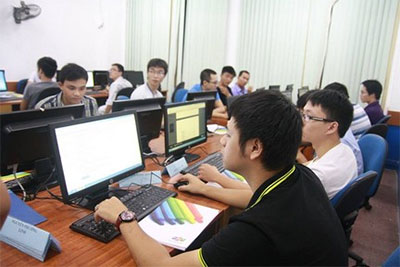IT manpower facing serious shortfall in quantity and quality
- Ngoc Huynh
The information technology (IT) sector is entering a hot growth period. However, Vietnam’s IT human resources are alarmingly lacking both in quantity and quality, as commented by deputy prime minister Vu Duc Dam.
Lack of human resources

“To expand production, in the first recruiting batch of 2017, we are recruiting thousands of engineers and bachelors who graduated or will graduate before December 31, 2017,” read Samsung Vietnam’s latest announcement in March 2017.
Samsung currently has eight centres and factories with more than 150,000 million employees over the world.
However, they require a huge amount of manpower in order to achieve their development plan.
FPT Software has brought 10,000 staff on board, raising the total number to ten per cent of the total domestic IT human resources. To carry out the growth plan during the 2017-2020 period, chairman of FPT Software Hoang Nam Tien emphasised that they target to recruit 20,000 staff to all positions of managers, programmers, bridge software engineers, comtors, and project managers.
Many of these positions will offer high salary and work abroad, such as long-term employment opportunities in Japan with salary ranging from $2.800-$3.000 a month.
“We have an advantage in digital transformation capacity and the rapid scalability of human resources of 30-40 per cent per year,” said Tien.
FPT Corporation is looking to recruit nearly 50,000 personnel for the positions of student interns, managers, senior leaders in the areas of engineering, technology, and economics by 2020.
The demand for IT personnel is growing rapidly in Vietnam Posts and Telecommunications Group (VNPT), Viettel, CMC, and a series of IT software companies, domestic startups, and multinational corporations operating in Vietnam, such as Samsung, LG, Intel, and IBM, to meet the demand to expand production and new orders.
According to the latest report by VietnamWorks on the Vietnamese IT sector in 2017, manpower demand hit an unprecedented peak with roughly 15,000 job postings in 2016. As predicted by VietnamWorks, given that 80,000 IT employees will graduate from school in 2017-2018, Vietnam is projected to face a critical manpower shortage of 70,000 IT staff.
As by 2020, the shortage will increase by 500,000 employees.
According to the Ministry of Information and Communications, the total current IT manpower is over 600,000 employees. Of this number, employees working in the hardware industry make up about 300,000.
The remaining staff are working in the field of software industry and digital content creation. Vietnam is forecasted to require 1.2 million IT employees by 2020.
Poor quality
Not only the shortage of manpower, the quality of IT human resources is also cause for concern.
At LG’s factory in Hai Phong, IT engineers working at the R&D centre have to further train and transfer in three years, workers involved in quality testing or product warranties must train from four months to a year, while assembly line workers will work after one month of training.
At FPT, university graduate IT engineers are obliged to re-train for a year.
To deal with training and re-training issues, Samsung has invested more than VND38 billion ($1.8 million) in supporting Vietnamese universities to develop high-quality IT human resources, while Huawei also spent more than $2 million on social programmes, mostly focusing on training and human resources development.
At a recent meeting with FPT University, Deputy Prime Minister Vu Duc Dam pointed out that the demand for human resources in the IT industry has increased dramatically, while the number of university and college graduates is very limited and falls far below the requirements of enterprises.
An important reason pointed out by the deputy prime minister is that “the higher education environment does not meet the needs of businesses and the economy.”
Nguyen Thanh Nam, vice president of FPT University, said that the IT industry is developing, changing day by day, so authorities should compile a reasonable training plan in the shortest time so that ordinary people can also participate in the fourth industrial revolution.
Minister of Information and Communications Truong Minh Tuan also affirmed that he will concentrate all resources to support, train, and develop human resources specialised in electronics, telecommunications, information technology, and information security.
He said the goal is not only to focus on quantity, but also to ensure the quality of expertise and especially to have the necessary soft skills and good foreign language skills to integrate further into the global technology market.
“In 2017, the Ministry will work closely with the Ministry of Education and Training to ensure the IT and telecommunication human resources training will be closely linked to market demand and technological development trends in the world. Moreover, training activities, scientific research and activities be closely linked to needs of enterprises in the field of IT and telecommunications will,” Minister Truong Minh Tuan said.
Source : http://english.vietnamnet.vn
